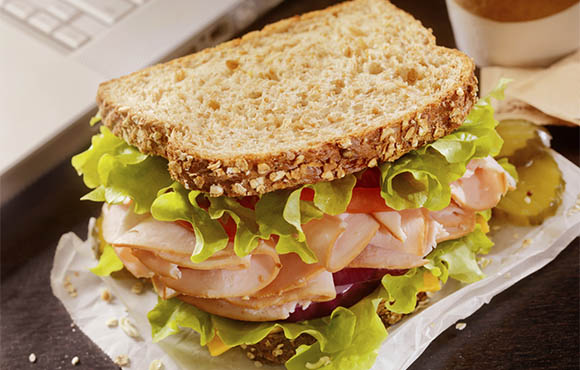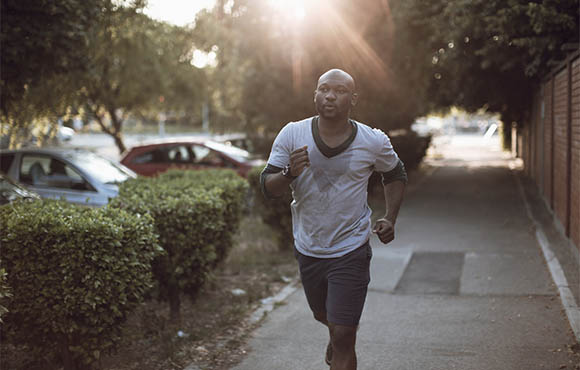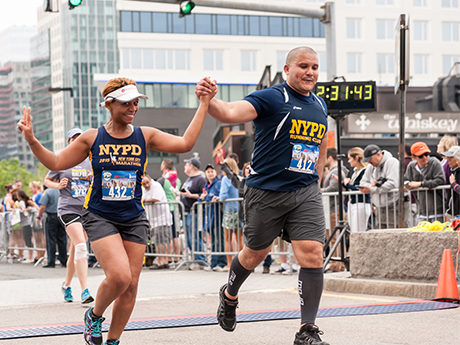1. They keep a running log.
1 of 17
There's nothing more motivating than recording a successful workout or long run. But even if a run doesn't go as planned, keeping track of the details can help you figure out what went wrong and how to make improvements for future runs. A log can be as fancy or low-tech as you want—as long as it works for you!
Find a
race.2. They schedule runs like meetings.
2 of 17
Even if it's just a hobby, top runners treat their runs like important appointments. They plan out runs in advance and give them a prime spot on their calendar. Slotting time for training will make you less likely to skip it!
Find a
race.3. They prioritize fuel.
3 of 17
Even if they've only got 10 minutes between a run and the next thing on their to-do list, the best runners don't let fueling fall by the wayside. They make sure to stay hydrated and consume a mix of quality carbs and protein after every workout. Try some greek yogurt and fruit or a small turkey sandwich after your next run.
Find a
race.4. They tap into a support network.
4 of 17
Whether it's an online message board or their running buddy down the street, they gather support when motivation or energy lags. Having trouble avoiding the snooze button? A sunrise running buddy will make sure you get out of bed. In-person accountability is best, but a text or phone call from a far-away friend may also work!
Find a
race.5. They make room for rest.
5 of 17
No matter how serious they are about training, the best runners also know the value of rest days and cross-training. Allowing muscles the chance to recover is the key to getting stronger and avoiding injury. Top runners also prioritize strength training—even if it's just a few minutes a day.
Find a
race.6. They switch things up.
6 of 17
Sure, they have a tried and true 5-mile loop, but rather than doing the same old runs every day, they work to keep things fresh. Some runs are tough and hilly, others are easy and on soft surfaces. By changing up each run, they keep boredom at bay.
Find a
race.7. They give each run a purpose.
7 of 17
When training for a race, long runs, speed work and recovery runs all have a spot in the plan. Top runners avoid "junk miles" by giving each run a specific reason (speed, endurance, etc.). But some times a run's only purpose is to have fun or de-stress—and that's okay!
Find a
race.8. They keep track of their shoes.
8 of 17
The best runners take note of when they get new trainers and when it's time to replace them. Most runners aim to buy new kicks every 500 miles or so, but that number depends on the individual. Is the tread wearing down? Are you getting aches in your feet and knees? It may be time to spring for a new pair.
Find a
race.9. They have a backup plan.
9 of 17
Even with a solid training plan and a spot on the calendar, sometimes even the most dedicated runners miss a run. If they oversleep the morning of a long run or have to work late and miss a tempo, they have a back-up plan. Whether it's shortening the run or moving it to another day or time, they stay flexible and do the best they can.
Find a
race.10. They remember why they run.
10 of 17
At the end of the day, running should be a source of joy, not stress. Sure, races may hurt and training takes hard work, but in a world of musts and shoulds, running is something we choose to do. Don't forget to have fun!
Find a
race.11. They keep their easy days truly easy.
11 of 17
Too many runners log all of their miles at a moderately difficult pace, but the best way to make fitness gains is to polarize training. The hard days (tempos, interval workouts, races) should feel very difficult while the easy runs should be at a comfortable, conversational pace. Recovery runs allow your muscles to regenerate and ultimately become stronger.
Find a
race.12. They plan out their running year.
12 of 17
Racing half marathons every month is the best way to get into shape, right? Not so fast. There's something to be said for racing often, but if your goal is to PR, it's best to choose a few key races throughout the year and build training around them. If you're set on, say, April and November marathons, make sure to plan out enough time for base building, peak training, tapering and, of course, post-race downtime. This is called periodization and the training peaks and valleys allow you to focus on the races that matter most.
Find a
race.13. They take care of the little things before they become big things.
13 of 17
Nagging hamstring tightness? Low energy levels? While some aches and pains might seem like a mere annoyance, smart runners take steps to fix them before they turn into major issues. If you focus on the everyday things like sleep, proper fueling and strength training, you'll keep your body running like a well-oiled machine.
Find a
race.14. They are consistent with their training.
14 of 17
We get it. Life happens and it's not always possible to stick to the plan, but for the most part, the best runners are quick to get back on the wagon. Alternating between intense training and inactivity increases injury risk and makes it tough to see fitness gains.
Find a
race.15. They set multiple goals.
15 of 17
Qualifying for Boston or crushing a PR will always be at the top of running wish lists, but successful runners also realize the importance of setting non-time goals. Some examples may include: running negative splits in a race, nailing your fueling strategy or finishing a training cycle feeling healthy.
Find a
race.16. They reward themselves regularly.
16 of 17
Whether it's a new GPS watch after finishing a marathon or just a latte after a morning run, rewarding hard work is key. Having mini rewards for the short term and bigger rewards for the long term can make a huge difference in how pumped you feel about training.
Find a
race.Get ACTIVE on the Go


Couch to 5K®
The best way to get new runners off the couch and across the finish line of their first 5K.
Available for iOS | Android






Discuss This Article